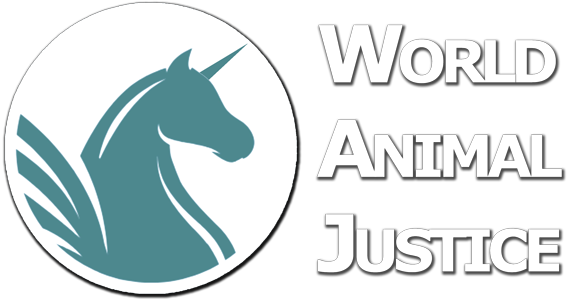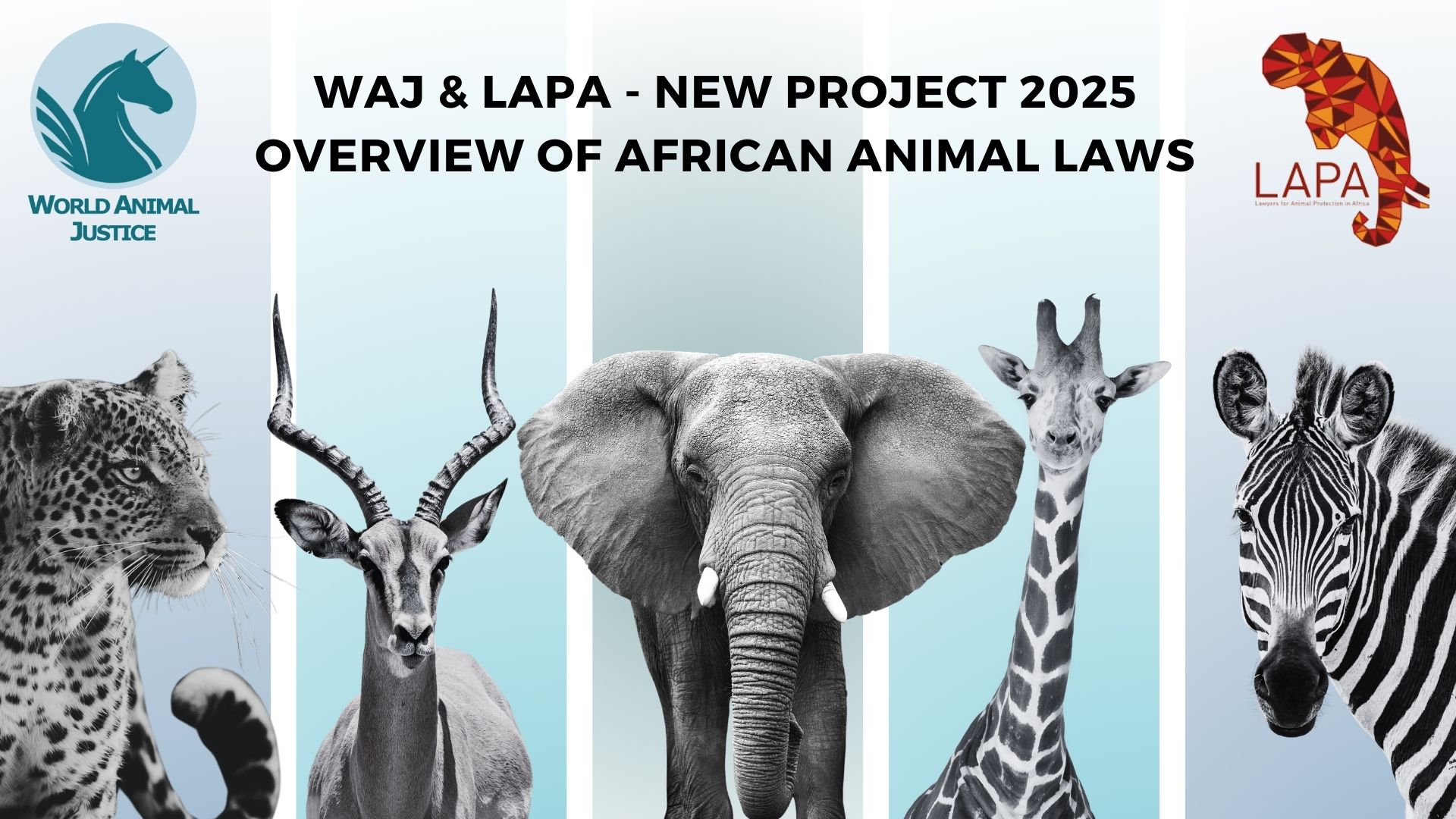🌍WAJ Project Launch for African Animal Advocacy! The First African Database of Animal Anti-Cruelty Laws
World Animal Justice (WAJ), in collaboration with Lawyers for Animal Protection in Africa (LAPA), is proud to announce the upcoming launch of a groundbreaking initiative for animals across the African continent: the African Database of Anti-Cruelty Laws.
Set to go live in 2025, this project builds on the success of WAJ’s Asia Database of Anti-Cruelty Laws and brings a new, user-friendly legal tool to Africa—aimed at increasing awareness, access, and enforcement of animal protection legislation.
🐾 What Is the African Database of Anti-Cruelty Laws?
The African Database will be the first-ever online legal database dedicated specifically to animal welfare and anti-cruelty laws in Africa. Unlike platforms focused primarily on conservation or environmental law, this project centers on animal ethics, legal protections against suffering, and humane treatment—core pillars of WAJ’s mission.
The database will:
- Cover all African regions, reflecting diverse legal traditions and approaches
- Compile and present national legislation and penalties related to cruelty toward animals of all categories: companion, working, farmed, and wild (where applicable)
- Include major continental legal instruments adopted by the African Union (AU), such as:
- The Animal Welfare Strategy for Africa (AWSA) (2018)
- The Ban on Donkey Skin Trade (2024)
The laws will be presented in a clear, searchable, and multilingual format, allowing activists, lawmakers, legal professionals, and the public to quickly access and use the legal information they need
📘 What Is the Animal Welfare Strategy for Africa (AWSA)?
The AWSA, adopted in 2018 by the African Union Inter-African Bureau for Animal Resources (AU-IBAR), provides a framework for integrating animal welfare into Africa’s development agenda. It promotes stronger legal systems, enforcement mechanisms, training, and intergovernmental coordination for animal protection.
The African Database will act as a practical implementation tool for AWSA, ensuring animal welfare laws are not only adopted—but also widely accessible and comparable.
🔗Read the Animal Welfare Strategy for Africa (AWSA) (2018)
🚫 What’s the 2024 Ban on Donkey Skin Trade?
In February 2024, the African Union made history by adopting a continent-wide ban on the slaughter of donkeys for their skins, following strong advocacy from civil society including The Donkey Sanctuary and African partners.
This ban was introduced in response to the rapid decline of donkey populations across Africa, fueled by the demand for ejiao—a gelatin made from donkey skin used in traditional Chinese medicine. The trade has been devastating not only for donkeys but also for rural communities who rely on them for transport and livelihoods.
The African Union’s decision sends a powerful legal and moral signal, and the new database will help ensure this landmark protection is fully reflected and enforced across national legal systems.
🔗 Read more on the AU Donkey Skin Trade Ban (BBC News, 2024)
🤝 A Partnership for African Animal Justice
WAJ is honored to work with Lawyers for Animal Protection in Africa (LAPA)—a leading pan-African NGO of lawyers committed to using legal tools to promote animal rights and welfare. LAPA’s deep knowledge of African legal systems and network of national legal actors makes them a crucial partner in this historic initiative.
This partnership is helping create the first animal law database in Africa that focuses explicitly on anti-cruelty and animal welfare protections, rather than solely on environmental or biodiversity conservation—a key ethical distinction that aligns with WAJ’s global approach to animal justice.
🔍 Current Phase: Research, Compilation & Accessibility
WAJ and LAPA teams—supported by a dedicated network of volunteers, translators, and legal researchers—are currently:
- Identifying and collecting official legal texts
- Verifying and updating national legislation
- Conducting legal analysis and tagging laws by type of cruelty and animal category
- Writing accessible summaries to make complex legal language understandable to all audiences
This work ensures the final platform will be exhaustive, accurate, and publicly accessible, tailored for both legal practitioners and grassroots activists.
📜 First Legal Findings: A Snapshot Across Africa
Early research has already uncovered a diverse legal landscape in Africa when it comes to animal cruelty protections—ranging from colonial-era laws still in force to recent constitutional reforms and penal code updates.
In Egypt, for instance, articles 355 to 357 of the Penal Code criminalize the unjustified killing or poisoning of animals, particularly livestock and working animals. Additional penalties apply when such acts occur at night. Egypt’s 2014 Constitution (Article 45) also mandates the state to ensure humane treatment of animals, linking animal welfare to broader environmental stewardship.
In Tunisia and Niger, although the legal texts primarily focus on animal health and husbandry, they include responsibilities for humane care that can form the basis for future welfare-based interpretations and reforms.
Morocco stands out for having common provisions in its 2018 Penal Code, with Articles 601 to 603 explicitly criminalizing acts of cruelty to animals. In Algeria, animal welfare is addressed both in dedicated legislation (Law No. 88-08) and in the Penal Code. Provisions prohibit mistreatment of domestic or captive animals, establish minimum standards of care, and allow animals to be rehomed by court order to a recognized protection organization—an example of judicial action enabling immediate welfare outcomes.
In countries such as The Gambia, Guinea-Bissau, Ethiopia, Eswatini, and Lesotho, national laws include specific anti-cruelty acts or penal code provisions dating as far back as the 19th and 20th centuries, often inherited from colonial administrations. These laws are sometimes outdated, but they still provide a basic legal foundation that can be modernized and built upon. Rwanda, South Sudan, and Somalia have integrated cruelty provisions into their criminal codes, often focusing on punishment for unnecessary harm or abuse. Zimbabwe also maintains legislation with relevance to animal welfare. The Prevention of Cruelty to Animals Act (Act 25 of 1960, as amended) remains in force and prohibits a wide range of cruel acts toward animals, including overworking, torture, and failure to provide adequate care. The Act grants law enforcement powers to intervene and seize mistreated animals, and it includes penalties for non-compliance.
This preliminary review shows the great potential for harmonization and improvement across African legal systems. It also reveals how many protections are already in place but remain underutilized or unknown. By bringing these laws together in one platform, the African Database will give animal advocates a powerful tool to:
- Raise awareness of existing legal protections
- Support legal enforcement and litigation
- Inform campaigns and reforms
- Conduct comparative legal analysis across borders and legal systems
🌐 Extending WAJ’s Global Reach
This database is a natural next step after the Asia Database and forms part of WAJ’s broader strategy to build a global infrastructure of animal law transparency. By highlighting the legal tools already available across Africa—and those still needed—this project supports a more just and compassionate world for all animals.
📌 Why This Matters
- Legal protection exists in many African countries, but it’s often hardly accessible in legal codes or outdated laws
- This database brings these laws into the light, making them accessible for advocates, lawyers, and lawmakers
- It provides a powerful comparative tool for pushing reforms, and strenghten enforcement of animal protection laws
- Most importantly, it places animals—and their suffering—at the center of legal visibility and global justice for all
For the first time, animal lawyers across Africa—and beyond—will have access to a powerful, centralized tool to trace, interpret, and compare legal protections for animals. This is more than a database: it’s a call to action in Africa and beyound!
🐘First Comparative Analysis of African Animal Laws by Sub-Region
Africa’s legal landscape regarding animal welfare is rich in diversity but marked by gaps and uneven implementation. While some countries have longstanding animal protection laws, others lack even foundational legislation. The development of comprehensive, enforceable animal welfare frameworks is not only a moral imperative but essential to addressing emerging threats from industrial farming, environmental degradation, and public health risks.
🌍 Northern Africa
Countries Analyzed: Morocco, Algeria, Tunisia
Key Strengths:
- National penal codes include animal protection articles, some as early as the 1960s.
- Laws prohibit actions such as poisoning livestock, spreading disease, and general cruelty.
Challenges:
- Most laws are decades old, with roots in colonial-era legal systems, and remain largely unchanged.
- Narrow focus on livestock and disease control; limited mention of companion animals or wildlife.
- Modern welfare standards (animal sentience, behavioral needs) are absent.
🌍 Western Africa
Countries Analyzed: Mauritania, Mali (others noted but data minimal)
Key Observations:
- Extremely limited legal coverage; lack of digitized or accessible legislative texts.
- Suggests weak or nonexistent national animal protection frameworks.
Challenges:
- Cultural, economic, and systemic obstacles to law development.
- Region is vulnerable to expansion of intensive livestock systems without legal safeguards.
🌍 Central Africa
Countries Analyzed: Chad, Central African Republic
Key Observations:
- No detailed legal frameworks were found or made accessible.
- Likely to reflect either total legal absence or data transparency issues.
Challenges:
- Extremely high need for capacity-building, legal drafting, and international collaboration.
🌍 Eastern Africa
Countries Analyzed: Eritrea, Djibouti
Key Observations:
- No anti-cruelty or animal welfare legislation surfaced in this review.
- An urgent opportunity exists to introduce basic protections and enforcement tools.
Challenges:
- Like other underserved regions, faces unique constraints such as poverty, post-conflict rebuilding, and food insecurity, which complicate legislative priorities.
🌍 Southern Africa
Countries Analyzed: Angola, Namibia
Key Strengths:
- Namibia enforces the Animals Protection Act, with clear language on prohibited acts, penalties, and species-specific coverage.
- Some enforcement mechanisms (e.g., fines and imprisonment) are defined.
Challenges:
- Legal frameworks, while present, are outdated (dating back to the 1960s-70s).
- Reforms are needed to integrate modern animal welfare science and standards.
🧠 Historical Context & Systemic Challenges
Many of Africa’s earliest animal protection laws originate from colonial legal codes, often focused narrowly on livestock protection rather than welfare principles. These laws were not rooted in local cultural values or indigenous practices and often remain unchanged decades later.
Modernizing these laws presents a unique challenge due to:
- Cultural traditions involving animal use in ceremonies, food, or livelihood.
- Widespread poverty and subsistence farming, limiting capacity for enforcement.
- The rising threat of industrial farming, which brings significant harm to animals, public health, and ecosystems, especially when unregulated.
Africa is thus a critical region of priority for animal protection efforts—not only to alleviate animal suffering but to preempt the spread of factory farming and its associated impacts on climate change, biodiversity loss, antimicrobial resistance, and food justice.
🧩 Comparative Insights
Region | Legal Coverage | Notable Gaps | Enforcement Provisions | Species-Specific? |
Northern Africa | Moderate | Companion animals, modern reforms | Partial | Mostly livestock |
Western Africa | Sparse | Foundational laws missing | Rare | Minimal |
Central Africa | Sparse | No known laws or data | Unknown | Lacking |
Eastern Africa | Sparse | No enforceable animal welfare laws | Unknown | Lacking |
Southern Africa | Moderate (esp. Namibia) | Outdated statutes | Present (Namibia) | Livestock-focused |
🦓 Recommendations for Animal Advocates
- Promote Regional Frameworks: Leverage African Union and regional bodies (e.g., ECOWAS, SADC) to establish shared animal welfare standards.
- Support National Reforms: Draft or modernize laws in line with international benchmarks (OIE standards, Five Freedoms).
- Build Capacity & Awareness: Empower lawmakers, lawyers, and civil society through training, education, and advocacy.
- Culturally Sensitive Advocacy: Align animal protection messaging with local values and livelihood realities.
- Counter Industrial Farming Expansion: Implement early legal controls to prevent unsustainable, high-intensity animal agriculture from taking root.


